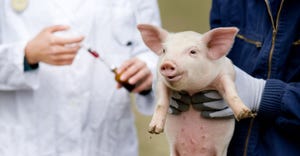Disinfectant Fails Against PEDV
December 26, 2013

The results of a National Pork Board funded study indicates that Stalosan F, a disinfectant powder commonly used in the poultry industry, is not effective at inactivating porcine epidemic diarrhea virus (PEDV) in swine feces on metal surfaces. The review of the research was provided by the American Association of Swine Veterinarians (www.aasv.org).
The study, conducted by Derald Holtkamp, DVM, at Iowa State University, was designed to replicate what is found in livestock trailers after fecal and other organic matter has been removed by scraping and sweeping, but not washed.
The hope was that the product might be efficacious at inactivating the virus in the presence of fecal material. These findings indicate that producers should not expect to kill PEDV with the use of Stalosan F disinfectant powder in a hog trailer that has not been properly washed. Thorough washing, disinfecting and drying of hog trailers between loads of pigs should be accomplished whenever possible.
The effectiveness of Stalosan F disinfectant in trailers that have been properly washed is unknown.
The disinfectant was also being studied to determine its impact on inactivation of the porcine reproductive and respiratory syndrome (PRRS) virus. Bioassay results are still undergoing testing and analysis.
The entire study may be viewed on the NPB web site.
Stalosan F is a broad-spectrum disinfectant alternative to liquid disinfectant that has been on the market for more than 40 years.
Like what you’re reading? Subscribe to the National Hog Farmer Weekly Preview newsletter and get the latest news delivered right to your inbox every week!
The results of a National Pork Board funded study indicates that Stalosan F, a disinfectant powder commonly used in the poultry industry, is not effective at inactivating porcine epidemic diarrhea virus (PEDV) in swine feces on metal surfaces. The review of the research was provided by the American Association of Swine Veterinarians (www.aasv.org).
The study, conducted by Derald Holtkamp, DVM, at Iowa State University, was designed to replicate what is found in livestock trailers after fecal and other organic matter has been removed by scraping and sweeping, but not washed.
The hope was that the product might be efficacious at inactivating the virus in the presence of fecal material. These findings indicate that producers should not expect to kill PEDV with the use of Stalosan F disinfectant powder in a hog trailer that has not been properly washed. Thorough washing, disinfecting and drying of hog trailers between loads of pigs should be accomplished whenever possible.
The effectiveness of Stalosan F disinfectant in trailers that have been properly washed is unknown.
The disinfectant was also being studied to determine its impact on inactivation of the porcine reproductive and respiratory syndrome (PRRS) virus. Bioassay results are still undergoing testing and analysis.
The entire study may be viewed on the NPB web site.
Stalosan F is a broad-spectrum disinfectant alternative to liquid disinfectant that has been on the market for more than 40 years.
You might also like:
Are We Frittering Away Profit Possibilities to Keep Facilities Filled?
Pit Foaming Remains Perplexing
You May Also Like



